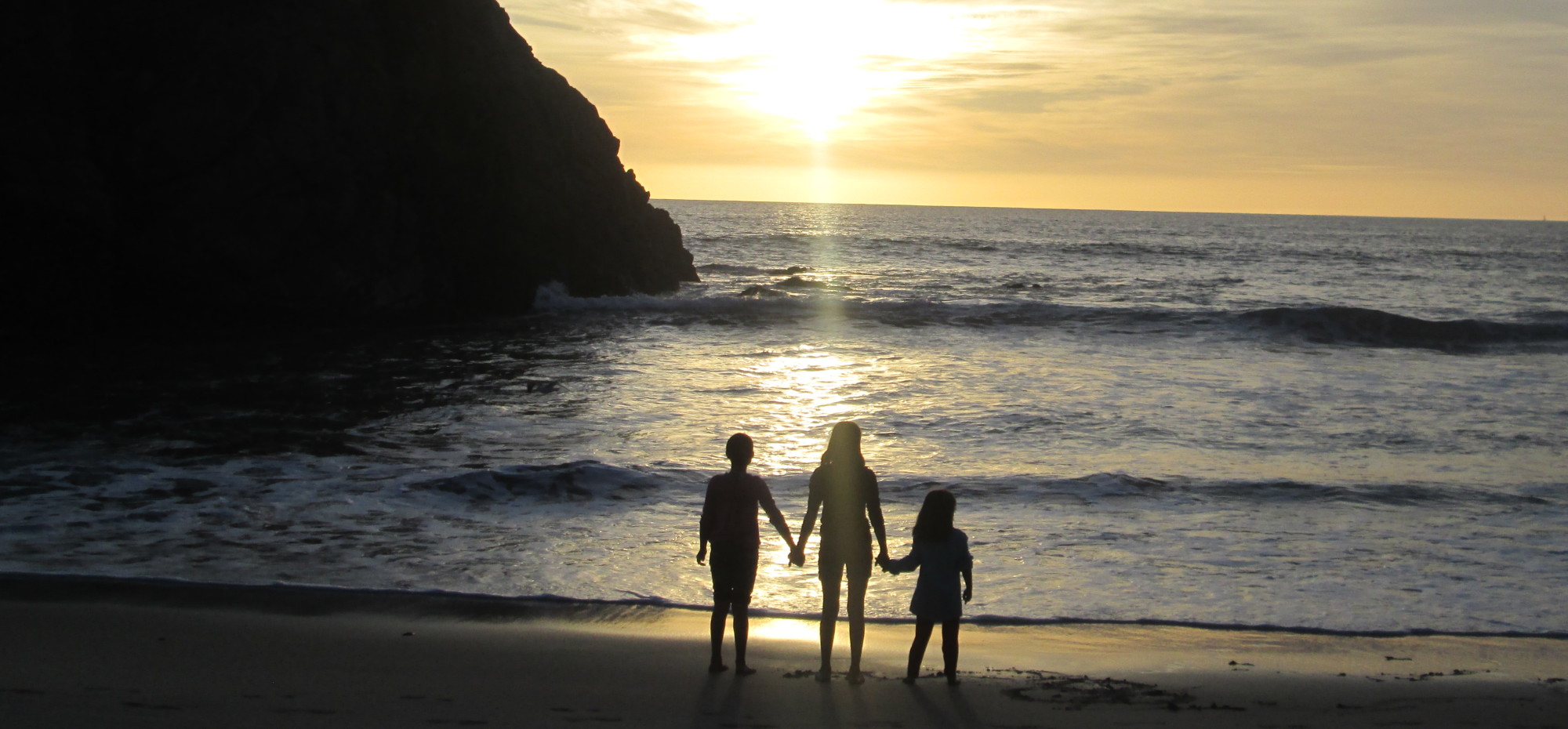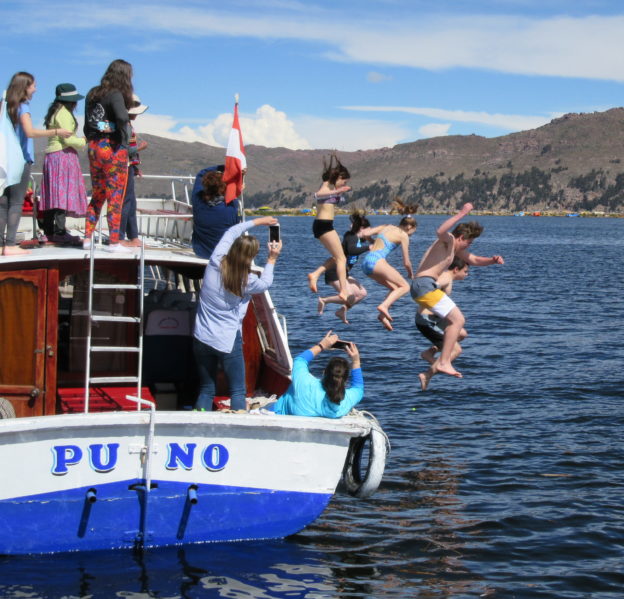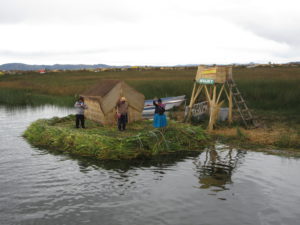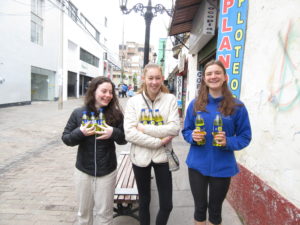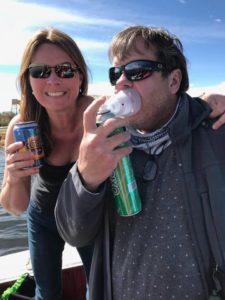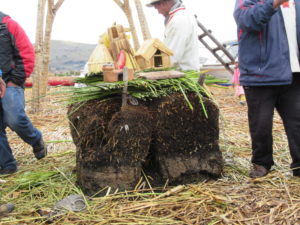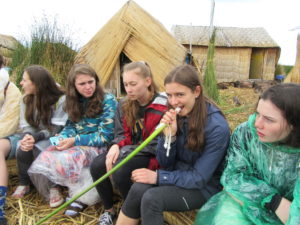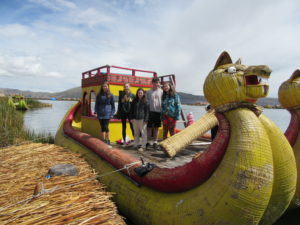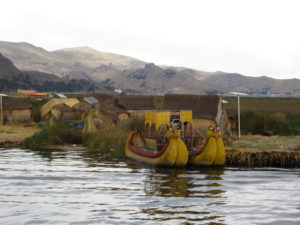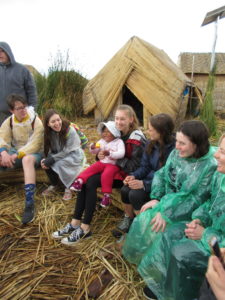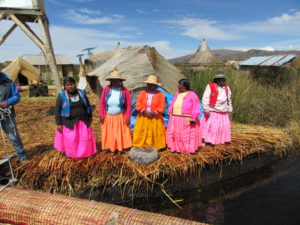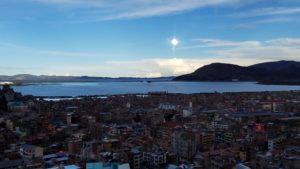Saturday was our last day in Peru. We were staying in a nice hotel near the center of Puno, on the shores of Lake Titicaca. (This was particularly luxurious for Zoe, Caroline and me. Throughout the trip we’ve been staying in a triple room, which was fine, but on this night our group had an extra room so I got my own. The triple that Zoe and Caroline were sharing was two separate rooms, so they had their own space as well.) In the morning we had a little extra time, so we wandered into town to look around the square and the church — 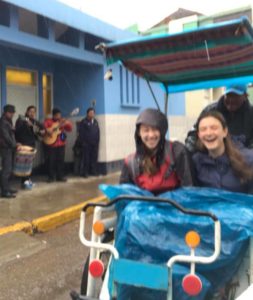 and, for certain members of the party, to stock up on the Peruvian Inca Kola, which tastes like carbonated bubble gum. The shops here are tiny — about the size of an average walk-in closet — so we had to go to several to find this many bottles. (Zoe’s, at least, survived the trip home in her suitcase.)
and, for certain members of the party, to stock up on the Peruvian Inca Kola, which tastes like carbonated bubble gum. The shops here are tiny — about the size of an average walk-in closet — so we had to go to several to find this many bottles. (Zoe’s, at least, survived the trip home in her suitcase.)
Unfortunately, this was the first day that dawned gray, drizzly, and cold — not ideal for a boating trip on Lake Titicaca. Van had one more surprise for us when it was time to get to the docks. He summoned a whole group of bicycle taxis, and offered an excellent tip to the one that could win the race. We jumped into the taxis in pairs, got covered with an inadequate sheet of plastic for rain cover, and set off as fast as our taxistas’ legs could pedal. These guys were motivated. At one point, Van’s taxi tried so hard to pass us that it crashed into an oncoming car. It was crazy and exhiliarating weaving through bicycle, foot, and vehicular traffic in the rain, careening wildly in the direction of the docks. Christine was so happy to have won that she gave her driver a tip probably worth a month’s wages.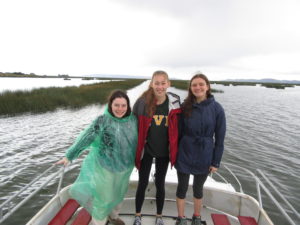
Once we boarded our boat and got underway, the rain tapered off and then stopped. Some of us headed up to the roof of the boat to check out the views of the vast lake (which we could only see a small part of). Our destination was the famous floating reed islands, inhabited by the Uros people, an indiginous group that
speak the Aymara language. Scholars think that the original islands were constructed in pre-Inca times, and have been inhabited by the Uros ever since. As lower layers of reeds rot, the islanders just add more reeds to the top. The modern-day Uros live much as their ancestors did, except that they have solar panels and tourists. They live in huts woven from reeds, travel in elaborate boats made of reeds, burn reeds for fuel, and even eat the reeds.
We visited an island inhabited by 22 people, all extended family. Walking on the island felt like walking on a waterlogged sponge. The islanders showed us how the islands are built — a time-consuming and labor-intensive process. (Apparently, when an island gets overcrowded, the inhabitants get together and build a new one.) A new layer of reeds has to be added every 15 days. The islands have to be anchored, they told us, or else you go to sleep and wake up in Bolivia. When someone asked what happens if a family isn’t getting along with the others, the elder of the island picked up a large saw and mimed cutting off a piece of the island and setting the troublemakers adrift.
We got to try on some traditional clothing, and go for a short ride in the largest of the reed boats. (“Boat fits 30 Americans, or 50 Japanese,” the village elder told us in Spanish.) We also were shown some of the woven and embroidered tapestries that the women here make, and it was made very clear we were expected to buy one. Unfortunately, it being our last day, we were running a little short of soles, so Helen and I had to split the cost of one. We’ll see who ends up with custody.
By this point the sun had come out and the temperature risen, so the more intrepid members of our group prepared for a jump into the freezing waters. Ann once again proved herself the best of us, as the only adult to jump in and the first one overall to take the plunge. The kids all went in together and came up laughing and gasping with cold.
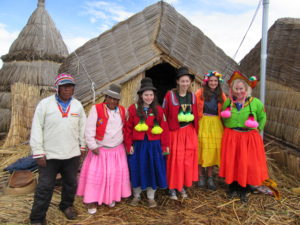 After the boat trip back, we had time for one last big meal before hopping on the bus for the last time to drive to the airport. You may recall what I said yesterday about Juliaca, the city where the airport is located. None of us were that thrilled about having to go back there — but the reality was worse than we could have imagined. What with the traffic situation and random road closure, our bus driver didn’t know how to get to the airport and apparently decided to wing it. We ended up on a small, incredibly potholed back road that was clearly leading nowhere. Undeterred, he tried to correct his mistake by making a series of seemingly random turns onto ever more desolate roads with even worse conditions. By this time it was dark, and we were truly in the middle of nowhere. I
After the boat trip back, we had time for one last big meal before hopping on the bus for the last time to drive to the airport. You may recall what I said yesterday about Juliaca, the city where the airport is located. None of us were that thrilled about having to go back there — but the reality was worse than we could have imagined. What with the traffic situation and random road closure, our bus driver didn’t know how to get to the airport and apparently decided to wing it. We ended up on a small, incredibly potholed back road that was clearly leading nowhere. Undeterred, he tried to correct his mistake by making a series of seemingly random turns onto ever more desolate roads with even worse conditions. By this time it was dark, and we were truly in the middle of nowhere. I
was waiting for a gang of people with guns to emerge from a nearby hovel and hijack the bus. My friend Tiffany was praying that we didn’t get a flat tire. Eventually, after what seemed like an hour, the bus driver saw someone driving around in one of these three-wheeled vehicles they have here and asked for directions. That kind soul offered to lead us to the airport, and thankfully managed to do so in time for our flight. We all — even Van — shuddered to think what we would have done if we’d missed it and been trapped for the night in Juliaca.
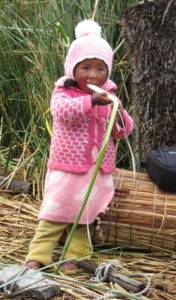 After that, all that remained was a long day and night of travel — from Juliaca to Lima, Lima to New York, and New York to Boston — exhausting, but fortunately uneventful. (This time I decided what the hell and went for the full dinner and glass of red wine that Latam Airlines was serving at 2am (3am Boston time).)The C&J bus brought us back to Portsmouth in time for Sunday dinner, tired but full of happy memories.
After that, all that remained was a long day and night of travel — from Juliaca to Lima, Lima to New York, and New York to Boston — exhausting, but fortunately uneventful. (This time I decided what the hell and went for the full dinner and glass of red wine that Latam Airlines was serving at 2am (3am Boston time).)The C&J bus brought us back to Portsmouth in time for Sunday dinner, tired but full of happy memories.
